STAY
CANADIAN HOTEL INTELLIGENCE
Legally speaking: Resilience is a long game
The business case for sustainable hotels

Hotel executives, who are also women Lending | The barbell effect What investors should know about CSR
Travel, tourism & hospitality: Playing in the same sandbox
Canadian Hotel Investment & Finance Issue
M ARCH/APRIL 2022
March/April 2022
Volume 2 Issue 2
staymagazine.ca
Publisher Joe Baker joe@staymagazine.ca
Managing Editor Stacey Newman stacey@staymagazine.ca
Advertising Sales
Stephanie Gadbois stephanie@staymagazine.ca
Produced & Creative Agency Boomerang Art & Design Inc. boomart.net
Contributors
Robin McLuskie, Alam Pirani, Joe Baker, Fraser Macdonald, Ed Khediguian, Phil Thompson, Jason Sarracini, Stacey Newman
Subscription Inquiries staymagazine.ca/subscribe
Visit
Twitter @StayMagazineCA
Instagram staymagazine.ca
LinkedIn Stay Magazine
© Copyright 2022 All rights reserved. No part of this magazine may be reproduced without written permission of Big Picture New Media, the publisher.
STAY is published six times per year by Big Picture New Media (BPNM), a subsidiary of Big Picture Conferences. For 25 years, Big Picture has been hosting the Canadian Hotel Investment Conference (CHIC) and other go-to conferences and events for Canada’s hotel industry. Subscription price: $110 per year, most single issues $18.95.
Big Picture New Media
45 St. Clair Avenue West, Suite 1001 Toronto, ON M4V 1K9
Editorial Advisory Board

Robin McLuskie Managing Director, Hotels, Colliers Hotels
Brian Leon President, Choice Hotels Canada
Brian Flood VP and Practice Leader, Hospitality and Gaming, Cushman & Wakefield
Scott Richer VP, Real Estate and Development (Canada), Hyatt Hotels

Ed Khediguian Senior VP, CWB Franchise Finance
Bill Stone President, Knightstone Hotel Group
Gunjan Kahlon VP Franchise Sales and Development, Wyndham Hotels & Resorts
Judy Sparkes-Giannou Co-Owner, Clayton Hospitality Inc.
Deborah Borotsik Senior VP, Beechwood Real Estate Advisors
Alan Perlis President, Knightstone Capital Management and CEO, Knightstone, Hotel Group

Alnoor Gulamani President, Bayview Hospitality Inc.
Christina Poon General Manager Hotel W New York – Union Square
Phil Thompson Business Lawyer
Sandra Kanegawa Owner, Heritage Inn Portfolio, X-Dream
online staymagazine.ca
us


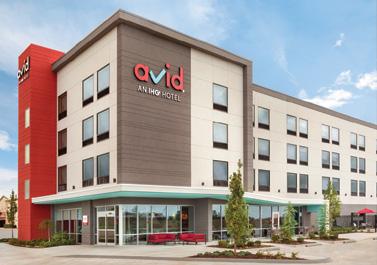






March/April 2022 DEVELOPMENT.IHG.COM ©2021 IHG Hotels & Resorts. All rights reserved. Most hotels are independently owned and operated. avid™ hotel Oklahoma City - Quail Springs Hotel Indigo® Lower East Side New York Candlewood Suites® Springfield voco™ The Franklin New York On the Cover CONTENTS 5 Publisher’s Note Leading with purpose and integrity 6 Innsights The Canadian Hotel Investment Conference (CHIC) DECONSTRUCTED 33 Collaboration Travel, tourism & hospitality: Playing in the same sandbox 36 Imperative voices Hotel executives who are also women 42 THE RECAP The Cartier Suite is a fairytale lakeshore cottage, part of the award-winning Manoir Hovey property in North Hatley, Que. 12 Intelligence Colliers SPECIAL REPORT: Hotel investment is back 17 CSR What is it (really) and what do investors need to know? 19 Legally speaking Resilience is a long game 21 Impact Building the business case for sustainable hotels 27 Lending The barbell effect HOTEL INVEST MENT

Leading with purpose and integrity
IT’S HARD TO REFLECT on the early months of 2022 and not feel like we are living in a deeply divided world. Irrespective of your definition of freedom, it feels like the outcome of some of the most challenging years in recent history brings with it a varied amount of conflict. We are collectively wrestling with being citizens of an ever-globalized world filled with strikingly differing perspectives and heavy doses of adversity. At home and abroad.
Adversity is a funny thing though. It doesn’t have a defined end or limitations. And it doesn’t seem to discriminate. It’s one of those equally impactful forces in our lives. But it also provides us with the opportunity to adapt, transform and grow. Painful as it may seem, times of great adversity can lead to some of the most defining milestones of all. A guiding force for many is the capacity to look forward, beyond the current conflict and adversity. To envision the future. And to make wise decisions to get there. This is the discipline of a mindful life.
It has now been two full years since the World Health Organization declared COVID-19 a global pandemic. We have all had to make some difficult decisions about our careers and our businesses to move from where we were to where we aspire to be. Regardless of how you overcame the adversity of the last twenty-four months, or how you are coping, if you are reading STAY Magazine and focusing on what comes
next, you deserve to foster some wellearned optimism in the year ahead.
This spring marks the in-person return of the Canadian Hotel Investment Conference (CHIC). 2021 brought the celebration of CHIC’s 25th year. Quite a milestone considering how much the hotel industry has changed over the last quarter-century. CHIC is an important milestone for this magazine too. STAY was conceived to add value to those who work in, with, own, invest in and run hotels across our beautiful country. Our relationship with all the Big Picture Conferences means we can extend important dialogue from the conference floor to the digital pages. It means we can continue to shape our insights and information from some of the richest sources of data and perspective—our industry’s leaders. We are excited to support this year’s conference by becoming the official media partner for CHIC in our first year of publication.
We have been affectionately referring to this as the Canadian Hotel Investment and Finance Issue of STAY Magazine. We have assembled a line-up of compelling and comprehensive content. You will recognize many of the themes as those you will experience at CHIC. And if you cannot join us in person, you can follow along right here, and we will do our best to bring the best of this industry, this country and the best of CHIC right to you. Wherever you are reading from.
Before you jump to your favourite piece, on behalf of the entire team at Big Picture, we wish you a successful and healthful year ahead. We also continue to hope for peace and unity at home and around the world. Canada’s hotel industry plays a vital role in our economy. With wise investment and intention, it can also make a positive impact on our nation’s socioeconomics, our environment and our culture. We are truly global in nature. Our decisions have never been as important and as impactful around the world as they are right now. Choose wisely. Lead with purpose.
Joe Baker Publisher


STAY Magazine PUBLISHER’S NOTE
March April 2022 | staymagazine.ca | 5
INNSIGHTS
The Canadian Hotel Investment Conference & Hotel Capital Connection 2022
These two fundamental Canadian hotel conferences are about reconnection and taking stock, reviewing business structures, attitudes and opportunities. Understanding the 2022 hotel sector requires that we ask difficult questions, make courageous decisions and move forward together against the backdrop of some major domestic and international geopolitical and economic forces.
#CHIC2022 takes place April 5th and 6th and #HCC2022 happens the following day, April 7th; both are taking place at the Sheraton Centre Toronto Hotel.
The panelists and speakers will provide comprehensive expertise on timely topics, so we won’t give away too much about that content, but we wanted to get their perspectives from more of an EQ point of view.
EVENTS + DEBRIEFS
Tracey Kalimeris Vice President, Talent & Culture, North & Central America Accor
What do you feel is (are) the most important issue(s) facing the Canadian hotel sector today?
• Reputation of sector as a viable employment/career option
Retaining and attracting employees based on our reputation
Competitive pay and benefits
How we structure and schedule work and our ability as an industry to be flexible
• Delivering on guest service expectations
If you could say anything to your colleagues in the sector…what would that be?
Let’s be bold – don’t get stuck with our same practices, we need to break out of our traditional box and do things differently
If you could say anything to your colleagues in the sector…what would that be?
Hang in there. The hotel sector has persevered to weather the worst of the pandemic – and has demonstrated resiliency in so many ways. The worst is behind us. Don’t be afraid to ask for help if needed.
Christine Kennedy, CPA, CA VP Finance Atlific Hotels


What do you feel is (are) the most important issue(s) facing the Canadian hotel sector today?
The most important issue facing the Canadian hotel sector is retention and recruitment of talent. We have come to fully appreciate the value of having the most talented people around us when our workforces became too lean for comfort. Let’s carry that appreciation forward by increasingly recognizing and generously rewarding our best and brightest to earn their lasting loyalty and inspire their best efforts in good times as well.
Curtis Gallagher Principal, Canadian Hospitality Lead Sales Representative Avison Young

What do you feel is (are) the most important issue(s) facing the Canadian hotel sector today?
The availability of suitable debt options across various asset types and markets will continue to be a major area of focus for the sector in the years ahead.
If you could say anything to your colleagues in the sector…what would that be? We all learned to do more with less. Productivity gains in our labour-intensive sector are hard to come by, and many of us figured out how to do as much work as we faced in pre-pandemic times with a significantly reduced workforce. Let’s hold onto those efficiencies that fall into the category of “work smarter” while happily bidding goodbye to those that fell into the category of “work harder” as we all give 110 per cent.
CURRENT
Humanity is at the heart of hospitality; here’s what our experts have to say about their outlook on the future.
6 | staymagazine.ca | March April 2022
We required economic patience and consideration from our financial partners to get through the roughest quarters of the pandemic-related recession. Let’s not forget how important those relationships can be and nourish them in the next upcycle when stronger top and bottom line results could lull us into taking our financial relationships for granted.
Doris Hager President Hager Design International Inc.

What do you feel is (are) the most important issue(s) facing the Canadian hotel sector today?
Bringing a renovated or newly built property to the market on time and on budget.
If you could say anything to your colleagues in the sector…what would that be?
Start planning your renovations early. Design takes approximately 4 - 8 months including most brand reviews and product lead times today are approximately 6 – 8 months. Be aware of tariffs placed on goods coming from some countries.
Hugo Germain VP of Operations Germain Hotels
What do you feel is (are) the most important issue(s) facing the Canadian hotel sector today?
Talent acquisition and retention
If you could say anything to your colleagues in the sector…what would that be?
Be ready … la visite s’en vient!
Dario Guescini Director, Work-Integrated Learning, Experiential Education & Global Mobility

 George Brown College
George Brown College
What do you feel is (are) the most important issue(s) facing the Canadian hotel sector today?
The most important issues facing the Canadian hotel sector are related to workers’ “re-attraction,” attraction and retention due to declining perceptions of the sector among the public and workers.
If you could say anything to your colleagues in the sector…what would that be?
We need to change our mindset regarding labour; we need to seriously think about labour as an investment more than ever before. Our business is evolving, so are the needs of the workers in the sector. We need to adapt rapidly to stay competitive.
If you could say anything to your colleagues in the sector…what would that be?
There was a reason you decided to work in this sector. Regardless of which aspect of it you decided to join. As we grapple with the workforce crisis on our hands, take a moment to reflect on why you are in this field. When you are talking to friends, family, colleagues and stakeholders, keep your “why” on the tip of your tongue. The workplace is often mischaracterized as a family. But the truth is, you don’t terminate your family when they don’t perform. You don’t pay them more when they exceed your expectations. A better description of the workplace is a community. In a community everyone takes care of the core priority—the health and success of the community. When we are gathered together with a purpose, we rally to preserve it. The hotel industry has a lot of meaning to the people in it and to the people who experience it. That is something we should share more of and something we should be proud of. If we do, the community will grow.
Joe Baker Consultant and Educator, Tourism & Hospitality CEO Joe Baker & Co.
What do you feel is (are) the most important issue(s) facing the Canadian hotel sector today?
There is no end to the era of disruption resulting from the pandemic. We will forever be in a state of flux. Just look at global events that have happened during and post-pandemic. There is a profound shift in consumer demand. Both from a business traveller and leisure traveller perspective. How we deal with change, lead through change and thrive in change will mean the difference between continuous growth or gradual extinction?
The hotel industry—investment and operations—is essential to the Canadian economy. But even the notion of the “economy” is due for a revisiting so we can create shared success driven by a shared sense of purpose. Everything is changing. We should be driving that change intentionally, not reacting to it.
Eric Plesman Head of Global Real Estate Healthcare of Ontario Pension Plan (HOOPP)

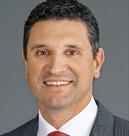
What do you feel is (are) the most important issue(s) facing the Canadian hotel sector today?
Given the significant impact COVID has had on the industry, the important issues are (I) how we build back consumer confidence to travel and enjoy the hospitality experience we are looking to offer, (II) work with government and the private sector to increase the labour pool to address the clear shortage of available talent.
If you could say anything to your colleagues in the sector…what would that be?
Continue pushing the industry forward by innovating and building on the momentum of the recovery. Invest in your people and assets to create the experience we know everyone is looking forward to.
March April 2022 | staymagazine.ca | 7
INNSIGHTS
The #CHIC2022 program at a glance
TUESDAY APRIL 5TH, 2022
Sheraton Centre Toronto Hotel
Location: Grand Ballroom
All times in Eastern Daylight Time (EDT)
2:00pm - 5:30pm
Exhibitor Set-Up
5:30pm - 8:00pm
Opening Cocktail Reception
Sponsored by Hilton
WEDNESDAY APRIL 6TH, 2022
Sheraton Centre Toronto Hotel
Location: Grand Ballroom
All times in Eastern Daylight Time (EDT)
7:30am - 8:45am Networking Breakfast
Sponsored by STR
8:45am - 9:00am Opening Remarks
Stephanie Gadbois
Managing Director Big Picture Conferences
9:00am - 10:00am SESSION 1: “Raindrops Have Stopped
Falling on My Head”
As we’ve moved through these difficult times, the plethora of data and predictions has made our heads spin. We are now rebuilding in many parts of the country, and some markets and properties have performed well. Find out from these leading experts the very latest on transactions, capital, valuations, and critical data points, what the next couple of years may look like and which markets and asset classes will lag and those that are poised for a robust recovery.

Sponsored by Marriott International
Moderator: Jeff Appleby
Managing Director, Real Estate Investment Banking
CIBC Capital Markets
Panelists:
Anthony Cohen
Executive VP & Partner, Crescent Hotels & Resorts Canada
President & CEO, Global Edge Investments
Curtis Gallagher
Principal, Canadian Hospitality Lead
Avison Young Alam Pirani
Executive Managing Director | Hotels | Canada & Caribbean Colliers Hotels
Carrie Russell
Senior Managing Partner, HVS
8 | staymagazine.ca | March April 2022
WEDNESDAY APRIL 6TH, 2022
Sheraton Centre Toronto Hotel | Location: Grand Ballroom
All times in Eastern Daylight Time (EDT)
10:00am - 10:45am SESSION 2: Controlling the Uncontrollable: Insurance and Property Taxes Examined
We now know the meaning of force majeure and understand all levels of government across the country are fiscally strained. But so are many hotel owners. These two “fixed” costs are not so stable. What can owners expect, and more importantly, how can they fairly manage these costs in the next few years?
Sponsored by Realstar Hospitality, Days Inn, Motel 6 and Studio 6
10:45am - 11:30am Tradeshow and Networking Break
Sponsored by Coast Hotels
11:30am - 12:15pm SESSION 3: Recruitment, Retention, and Rethinking Hospitality Human Capital
In this facilitated panel discussion, experts from across the national workforce development, corporate hotel, and higher education landscapes will present brief reflections on the present state of the hotel industry’s labour conditions, best and better workplace practices, and emerging innovations in the world of recruitment, retention and rethinking human capital.
Sponsored by Best Western Hotels & Resorts
12:15pm - 1:30pm Tradeshow and Lunch
1:30pm - 1:45pm Hotel Association of Canada Update
Sponsored by Goodmans
1:45pm - 2:30pm SESSION 4: Let’s Get It Started: Value Creation Through Capital and Procurement Upheaval Guest satisfaction scores have dropped, your asset needs capital, and the brands, while forgiving through COVID, are now looking for improvements to be initiated. The problem is cash flow is tight, labour costs are rising, and getting your materials in on time and budget is challenging. Learn what you must do to set your property up for success in the next two years.
Sponsored by IHG Hotels & Resorts
Moderator: Christine Kennedy, CPA, CA Vice President, Finance Atlific Hotels
Panelists: Terry Bishop President, Property Tax, Canada Altus Group
Kinnari Lakhani Senior Vice President
Arthur J. Gallagher Canada Ltd.
Moderator: Joe Baker, MEd Publisher STAY Magazine
Panelists:
Dario Guescini
Director, WIL, Experiential Education & Global Mobility George Brown College
Tracey Kalimeris
Vice President, Talent & Culture, North & Central America
Accor
William Loughran President, Evolution Hospitality
Aimbridge Hospitality
Philip Mondor President and CEO Tourism HR Canada
Moderator: Hugo Germain Vice President, Operations Germain Hotels
Panelists: Michael Grubsztajn Vice President
Jemlor Hospitalité
Doris Hager Owner and Principal Hager Design International Inc.
March April 2022 | staymagazine.ca | 9
The #CHIC2022 program at a glance (con’t)
WEDNESDAY APRIL 6TH, 2022
Sheraton Centre Toronto Hotel | Location: Grand Ballroom
All times in Eastern Daylight Time (EDT)
2:30pm - 3:15pm Session 5: Canada and the New World Economic Disorder Set Straight
These laser-focused economists will give us the straight goods. Where are we really heading-recovery or slump? What permanent and temporary changes to the economy can we expect, and how do we navigate all the moving parts? Will Canada expedite the return of muchneeded pre-COVID immigration levels? These experts will provide real-time colour on the significance of all tiers of the government debt, interest rates, and inflation and how the rest of 2002 could unfold. Hold on.
Sponsored by Hyatt Hotels & Resorts
3:15pm - 3:45pm Tradeshow and Networking Break
3:45pm - 4:45pm CEO Closing Keynote
With over 5200 hotels, 11 brands in 110 countries, Sébastien leads one of the largest global hotel companies in the world. The view from his perch is wide and long. Come listen and understand his perspective on evolving domestic and international guest needs, the movement and requirements of diverse investment capital, and the steps Accor has taken to reignite hotel demand.
Sponsored by Accor
Moderator: Sabrina Maddeaux Columnist
National Post
Panelists: Michael Gregory, CFA Deputy Chief Economist and Head of U.S. Economics, Managing Director BMO Capital Markets
Nathan Janzen
Assistant Chief Economist, RBC
Moderator: Eric Plesman Head of Global Real Estate
HOOPP | Healthcare of Ontario Pension Plan
Closing Keynote
Speaker: Sébastien Bazin Chairman and CEO Accor
hotelinvest.ca/2022
The #HCC2022 program at a glance
Thursday, 7 April 2022
Sheraton Centre
Toronto Hotel
Location: Grand Ballroom
All times in Eastern Daylight Time (EDT)
7:30am - 8:30am Breakfast 8:30am - 8:35am Welcome & Opening Remarks
8:35am - 9:00am Market Update - STR
hotelcapitalconnect.ca/2022
9:00am - 10:00am Session #1 - Spotlight on material legal and lending trends, issues and challenges
10:00am - 11:00am Session #2 - It’s time to dust off the agreements, critical deal points that can’t be missed
11:00am - 11:30am Networking Coffee Break
11:30am - 12:30pm Session #3 - Don’t worry, be optimistic! Stabilizing and enhancing stakeholder relations
12:30pm - 1:30pm Networking Lunch
1:30pm - 2:30pm Session #4 - Hotel investment boot camp, underwriting and executing the capital raised during the recovery phase with a spotlight on senior, mezzanine and construction lending
2:30pm - 3:30pm Session #5 - Is it time to buy or sell? Strategies for Success
3:30pm - 3:35pm Closing Remarks
10 | staymagazine.ca | March April 2022
HOTEL INVEST MENT
The transaction pipeline is picking up and we are optimistic about a strong year of trading volume, with a good mix of geographic distribution.






SPECIAL REPORT
Hotel Investment is Back
 Robin McLuskie Managing Director | Hotels Colliers Hotels
Robin McLuskie Managing Director | Hotels Colliers Hotels


 Fraser Macdonald Director | Hotels | Canada Colliers Hotels
Fraser Macdonald Director | Hotels | Canada Colliers Hotels
 Alam Pirani Executive Managing Director Hotels Canada & Caribbean Colliers Hotels
Alam Pirani Executive Managing Director Hotels Canada & Caribbean Colliers Hotels

It’s hard to believe we are already welcoming Spring when it feels like yesterday that we said goodbye to 2021. The Omicron variant pulled the breaks on what we thought would be a strong and busy start to Q1 for new investment activity. Despite a relatively slower start, we are finding that investors and stakeholders alike are demonstrating their resilience and commitment to the hotel space and believe the end is near for lockdowns and as travel, mask and vaccine restrictions are largely being lifted by early April.





Investing | Colliers Special Report 12 | staymagazine.ca | March April 2022
2021 Transaction
Volume by Sale Type
• The transaction pipeline is picking up and we are optimistic about a strong year of trading volume, with a good mix of geographic distribution.
• 2021 transaction volume ended the year at nearly $2 billion, more than double that of 2020 ($862M) and up 13 per cent from 2019 ($1.76B).
• The mix of buyers in the market is well diversified with each investor category being well represented, a trend we see continuing throughout the year.
• Aiding the recovery is some 6,500 rooms that have been removed from national hotel inventory from alternate use transactions since the start of the pandemic. This
represents approximately 1.5 per cent of Canada’s pre-COVID hotel room stock.
• Many owners believe lodging demand will start recovering at a quicker pace than predicted, with average rate holding strong as we patiently await increased demand.
• There are a significant number of experienced operators in our industry that recognized early on that small tweaks in their operating model could dramatically help through the pandemic, in addition to the strong support from government and lenders. Canadian hotel owners were well-capitalized going into the pandemic.
$14,688,000 ($172,800 per room) $1,250,000 ($20,200 per room)
Acquired for conversion to alternate use.
Non-core asset disposition by Pomeroy Hotels. Subsequently rebranded as a Coast Hotel.
$20,900,000 ($209,000 per room)
Strong per room pricing for extended-stay product in a secondary market
$5,900,000 Portfolio Allocation ($173,500 per room)
Acquired with three commercial buildings in Edmonton for $19 million.
Comfort Inn Waterloo Pomeroy Inn & Suites Grimshaw TownePlace Suites Belleville Union Bank Inn
Transaction
Q1 2022
Profiles
Colliers Hotels VOLUME $1.98B HOTEL 57%
25% ALTERNATIVE
March April 2022 | staymagazine.ca | 13
Source:
ALTERNATIVE USE / CONVERSION
USE / REDEVELOPMENT 16% DISTRESS 16%
The year ahead…
The recently launched 2022 Canadian Hotel Investment Report showcases key themes to watch this year. We have built on these themes below, adding additional commentary as we move into brighter days ahead.
Hotel Investment is Back 1
CATCH UP CAPITAL AND THE RETURN OF MAJOR MARKET HOTEL TRADES
• “Catch Up” capital sitting on the sidelines through the pandemic and “COVID Fatigue” among owners should bring assets to market and fuel increased hotel investment.
• With social housing programs and other government funding largely allocated, traditional transactions will accelerate, with full-year volume estimated at $1.5 billion.
• Strong competition among core real estate classes (office, industrial, multi-family) should provide tailwinds for increased capital allocation to the lodging space, and expect to see more transactions in urban markets.
• The rise in larger property transactions in the full-service lodging space is an important barometer on capital and financing market conditions, which have turned positive since mid-2021.
2
COMBATING LOCAL AND GLOBAL ECONOMIC TURBULENCE
• Consensus is for strong Canadian GDP growth in 2022, although geopolitical instability in Europe, rising inflation and a potential increase in interest rates will need to be monitored.
• Employment has returned to pre-pandemic levels with the Canadian unemployment rate below 6 per cent, but skill mismatches and labour shortages are hurting potential output, particularly in the hospitality and tourism industries.
• A stable Canadian dollar, strong domestic housing market and rebound in overall activity post-COVID support the economy through the medium-term.
CAP RATES AND REAL ESTATE VALUES IN-LINE WITH PRE-PANDEMIC LEVELS
• Canada’s primary markets continue to demand cap rates in the 5-7 per cent range, and the spread between transactions in primary and secondary markets are typically averaging around 100-200 basis points.
• It’s difficult to ascertain true stabilized net income and as a result, more weight is given to price per room and replacement cost benchmarks as well as anticipated recovery time when assessing values. Buyers and sellers continue to use 2019 as the benchmark in most cases.
3 4
FINANCING CONDITIONS REMAIN STRONG, NEW CONSTRUCTION LIMITED
• Debt is available, with proven borrowers able to achieve attractive rates, which will help improve liquidity as lenders regained their appetite for hotel real estate early to mid-2021.
• Vendor financing will continue to help price stability.
• Debt for construction financing remains scarce and likely will not return for another 12 to 18 months once operating performance has shown more improvement.
• Quickly rising construction costs and slow development timelines are also influencing a greater focus on investors acquiring existing assets rather than building new.
The recovery is underway, but it will be a journey until we see more normalized levels. There is resilient pent-up demand for travel, particularly for leisure, and hybrid leisure/business travel and as the Spring season approaches, we expect a faster than anticipated rebound on the demand front, which should help kick start the cycle. We have already begun to see optimistic lodging investors return to the market and we are expecting additional momentum to lodging investment throughout the year.
Investing | Colliers Special Report
14 | staymagazine.ca | March April 2022
Hotel Investment is Back




Regional Analysis
1. Investment activity was split fairly evenly between both sides of the country with the eastern half (east of Manitoba) posting a nearly 25 per cent premium in average price per room over the west, elevated from several high watermark trades.

2. Trading volume was highly concentrated in Ontario, British Columbia, and Alberta with the three provinces together accounting for 85 per cent of national volume, buoyed by a heavier concentration of alternate use, redevelopment, and large full-service transactions.

3. Following a quiet 2020, border restrictions didn’t dismay interprovincial investor interest in the Atlantic region which saw a more than doubling of transaction volume yearover-year to $67 million with approximately 75 per cent of volume acquired by Ontario-based hotel investment companies and private investors.


4. Trading in Canada’s large urban regions reached nearly $1.2 billion in 2021 as markets from Victoria to Greater Halifax saw notable year-over-year increases in trading volume with approximately 44 per cent arising from acquisitions for hotel use.




Investing | Colliers Special Report
Trading in Canada’s large urban regions reached nearly $1.2 billion in 2021
March April 2022 | staymagazine.ca | 15
Canada’s primary markets continue to demand cap rates in the 5-7% range
Hotel Investment is Back
2021: In review
Canada’s hotel real estate market gained significant momentum in 2021. This included about 40 per cent of volume (roughly $800 million) related to acquisitions for alternate use and redevelopment, with substantial activity driven by government funding programs.
The experiences learned through the various lockdowns provided greater confidence to buyers, sellers, and lenders with sightlines to the other side of the pandemic becoming clearer and driving a tipping of the scales towards acquisitions for hotel use. With pandemic concerns receding, the outlook for travel demand looks bright as the industry enters 2022. A return to normalcy is on the horizon and one thing is certain—hotel investment is back.
2021 Key Takeaways
• Total transaction activity accelerated in the second half of the year pushing annual volume to nearly $2 billion, more than doubling that of 2020 ($862M) and up 13 per cent from 2019 ($1.76B).




• Average price per room including all types of transactions was $158,100, up 15 per cent yearover-year and 16 per cent from pre-COVID transaction trends in 2019.
• Acquisitions for hotel use played a more dominant role in 2021 at nearly 60 per cent of total volume and traded at relatively strong pricing averaging $134,000 per room compared with $130,100 in 2019.

• Government subsidies and a generally supportive lending community mitigated any significant distress in the hotel asset class; lender-driven sales remained at historical lows (2 per cent of volume).
• Small but mighty, trades of $5 million or less accounted for just over 40 per cent of all transactions for the year with limited-service hotels under 100 rooms being the most fluid segment for trading.
• Substantial hotel deals in major urban and resort markets significantly elevated transaction volume with eight trades over $50 million, representing almost a third of the year’s total.
• Company sales, portfolio repositioning, and noncore asset dispositions by multiunit owners drove the bulk of the year’s nine portfolio transactions valued at approximately $495 million (25 per cent of volume).
(Source: 2022 Canadian Hotel Investment Report, Colliers)
Investing | Colliers Special Report
16 | staymagazine.ca | March April 2022
2021: Trades for continued hotel use totalling $1.18 billion amounts to an impressive showing compared to roughly $400 million in 2020.
What is corporate social responsibility or CSR and what do investors need to know?
By: Limin Fu Lecturer in Management, University of Newcastle Dirk Boehe Professor, Université Mohammed VI Polytechnique
With the world facing an ever-growing number of environmental and social challenges, investors are increasingly expecting corporations to “do the right thing” and contribute positively to the community. This is known as corporate social responsibility or CSR. Investors play an important role pushing firms towards becoming better corporate citizens.
So, what do investors (including those of us with superannuation invested in companies) need to know about corporate social responsibility? And why does it matter?
What is CSR anyway?
U.S. writer and economist Howard Bowen is often described as the “founding father” of CSR. He wrote in 1953 that business has a social responsibility, defined as: the obligations of businessmen to pursue those policies, to make those decisions, or to follow those lines of action that are desirable in terms of the objectives and values of our society.
The concept was popularised in the US in the 1970s, especially after U.S. think tank the Committee for Economic Development in 1971 noted there is a “social contract” between business and society, saying:
Business is being asked to assume broader responsibilities to society than ever before and to serve a wider range of human values. Business enterprises, in effect, are being asked to contribute more to the quality of American life than just supplying quantities of goods and services.
In other words, there was growing acceptance of the idea it was not enough for companies just to pay taxes. To gain a “social licence to operate,” firms should also actively “do good” in society. In the mid-1990s, the term “triple bottom line” was brought to prominence by U.S. author and advisor John Elkington, which he describes as: a sustainability framework that examines a company’s social, environmental, and economic impact.
CSR and ESG investing
More recently, the term environmental, social and governance (ESG) has grown more common. Although ESG and similar obligations are not necessarily legally compulsory for most companies, many investors see good policies in this area as a sign the firm is well-positioned for the future. Some common issues many investors care about include:
- a company’s carbon footprint
- the use of toxic chemicals
- ethical supply chains

- employment equity
- social inclusion
- community engagement, and
- board diversity.
Investing | CSR
March April 2022 | staymagazine.ca | 17
What do investors need to know about CSR
For many investors, ESG is fundamentally about how a company serves the environment, workers, communities, customers, and shareholders.
Why do some firms pursue some CSR goals while neglecting others?
We recently completed a study pondering the question: why do some firms ignore some stakeholders while courting others?

We categorized companies into six distinct “types”: the CSR vanguard, the opportunist, the generalist, the minimalist, the specialist and the laggard. Vanguards proactively pursue a wide range of CSR goals that address an array of stakeholder concerns, even without much pressure from investors. A generalist has genuine commitment to CSR goals but doesn’t really favour one area over another.
But if the company only pursues CSR goals on some issues while others are all below the industry or country average, this company might be what we termed a CSR “opportunist.”
Big superannuation companies and investment professionals often have specialist research teams dedicated to identifying which companies have a good record on CSR.
They have access to search tools such as Refinitiv, MSCI KLD, Sustainalytics, Bloomberg ESG, and RepRisk AG to help them sort the wheat from the chaff.
So there’s a limit to how much an individual investor can expect to find out on their own about the firms they invest in.
How do I research companies and their CSR record?
Expecting individuals to expertly navigate this topic on their own is unrealistic.
But you can try. Look in your investment platform (meaning the website or app through which you manage your investments) for ESG information about various firms.
Search online for more detail. Has media coverage revealed any scandals linked to companies you invest in, around
issues such as environmental protection, Indigenous rights, social justice, employees’ rights, human rights or corporate governance?
Who runs the company? Who is on the board? Search their names and see if you’re happy with what you find.
Have a look through the company’s recent annual reports. Look for chapters with titles such as sustainability report, social impact report or corporate social responsibility report. Thanks to many years of pressure from investors, most companies will detail their efforts to some degree.
But beware greenwashing and slick marketing. Some companies can be quite deceptive in the way they talk about corporate social responsibility. For example, they may have improved their environmental record but continue to have a poor record of how they treat workers.
Our research has identified causes and consequences of such inconsistent CSR practices. An inconsistent record on CSR could pose risk to your money in the long run. Think carefully about how a firm’s irresponsible practices in one area can cancel out corporate social responsibility gains in another.
And if you see room for improvement, let the company know. You can do that by posting questions and comments on its social media platform and using its “contact us” option on its website.
Or, in the worst scenario, you can inform your investor community and collectively sell your shares to keep the company in check—share prices can convey your dissatisfaction.
Your voice may be one of many building to a groundswell and exerting pressure on the company to do better.
Investing | CSR
18 | staymagazine.ca | March April 2022
THIS ARTICLE IS REPUBLISHED FROM THE CONVERSATION.
2022 will demand extra patience and vigilance
By Stacey Newman
With Phil Thompson, Transaction Advisor, Business Lawyer
If the last two years have taught us anything—in life and business—it’s that resilience is a long game. The year ahead will involve myriad challenges as the hotel and hospitality industry regains a semblance of normalcy. Within that framework, hoteliers across Canada will be making big decisions, preparing to buy and sell assets, mitigating financial trials as well as traversing a changed business landscape during what will likely be a highly transactional year.


With that being said, it is prudent to consider the hotel and hospitality outlook from the perspective of the law. Since graduating from the University of Toronto Law School (JD) in 1980, Phil Thompson has counselled business owners and partnerships and guided the purchase, sale and financing of hundreds of businesses, commercial properties, and hotels. Thompson’s primary activities are transaction advisory, partner relations, succession planning, and general business advice including advisory board and family counsel participation. In the following interview, Thompson provides his expertise and opinions about what lies ahead in Canada’s hotel sector, legally speaking
Q&A
What do you think the market will be like for hotel transactions in 2022, especially compared to the last few years?
I think there is still a lot of uncertainty out there, around the hospitality industry and the economy generally, so it is hard for me to make predictions with a strong sense of certainty. But my personal expectation is that it will be robust. There is a lot of money out there looking for a home fuelling demand for the sort of investment platform offered by hotels, so I believe the buyers
will be there. And I think there will be sellers who for a variety of reasons will be looking to get capital out of hotels or deploy it in different ways in the industry. I am curious to hear what the mortgage brokers say about lenders. After every industry setback, some lenders leave but new ones come in. I expect financing will be available too, but perhaps not from the same mix of lenders we had before the pandemic. I think the near future will be robust, but cautious and maybe slow to get going.
What about prices over the next year?
This is the fourth economic correction in my career—not including two major stock market meltdowns and SARs—but what makes this one different is the absence of a distress market. In the previous three, there were no government or lender supports like there are this time, and there was a brief but intense period in each of them when bargain hunters with the cash and financing to close good do really well. Some of my clients made real traction in the early 1990s for example. But that has not happened this time and I do not see it happening. I expect pricing will be pretty close to what it was before the pandemic. Sellers who have financeable price expectations or have the ability to provide financing support like VTBs or deliver lenders should get their asking prices. Buyers should not expect any low-hanging fruit.
Investing | Legally Speaking
March April 2022 | staymagazine.ca | 19
Phil Thompson
2022 will demand extra patience and vigilance
Are there unique post-pandemic issues you think buyers and sellers should keep in mind?
I do not think anyone can take financing for granted. We have to see what lenders will be in the market and what their expectations will be. The ability of buyers to get financing, or the ability of sellers to do what they can to ensure that buyers can get financing, could be really important. Then there are the labour market conditions. The ability of buyers to find labour will also be something no buyer can take for granted, so management retention, union expectations, impending labour rate changes and possible severance obligations are all things buyers and sellers will have to look at more carefully. There are various pandemic support programs that might have to be considered if their continuity is important to the property. Finally, there are all the construction, renovation and supply chain issues to be careful of, which can affect a buyer’s postbuy improvement plans. These are some key things that might have not been as important in 2019 but I think need some extra vigilance and patience going into 2022.
Do you have overarching advice for buyers and sellers in 2022?

The usual things come to mind. Assemble a good team and have them ready to go, including a broker, mortgage broker, accountant, tax consultant, labour lawyer and transaction lawyer. Have a pre-determined investment or redeployment strategy mapped out so you know what you are looking to accomplish and why. And for 2022, be prepared to be extra patient and even more collaborative than you might normally be.
From the buyer side, do not expect any bargains, widen your geography, do not rush to spend the money you have set aside, believe that the right deal for the right property with the right seller is out there and will come your way eventually. There will be opportunity, don’t be afraid of missing out on something unless it is something particularly unique. Consider markets that
will recover quickly and be a bit cautious about those that will take longer, or properties with aggressive PIP requirements.
For sellers, do not overplay your hand. Many sellers act like they are doing a buyer a favour by selling them a property the seller doesn’t want anymore. This might not be the year to have that mindsight. There is a lot of money on the buyer side of the table, and they have lots of things they can do with it. Buyers haven’t been sitting on their hands. Many have branched out into hotels outside Canada, or have gotten into plazas, multires, mortgage lending, and other things. The buyers with the best ability to fulfill on the deal may be the ones least likely to be rushed into something. And do not act like you have something to hide. If sellers act like they have something to hide that is how it will be interpreted. Get a fulsome data room up and running before you go to market and stay engaged with the buyer from the LOI through to closing.
Will you be handling transactions in 2022 any differently from previous years?
I don’t think so. I have acted on the purchase and sale of hundreds of businesses including hotels. I approach them all as a relationship opportunity. Deals really work best with the least amount of aggravation if the buyer and seller respect each other and want to do business together. This is very true in our hotel market in that the industry is small, and everyone knows or knows of everyone else. I try to foster a good buyer and seller connection by focusing on fairness, patience and reasonable risk allocation. Drill into the practical business side of things. The deals are “as- and where-is” now so there should not be a lot to disagree over, provided the seller accepts the buyer is not going to risk more than its deposit before closing. The biggest impediment to any deal is price. Once price is sorted out the deal should come together, provided it is financeable, and the parties are transparent, patient and collaborative. Those fundamentals will hold true in 2022 as well…I think.
Investing | Legal
20 | staymagazine.ca | March April 2022
Building the business case for sustainable hotels
 By Joe Baker
By Joe Baker
Being born and raised in beautiful British Columbia has a way of influencing a young mind to embrace the natural environment and how it becomes blended with urban life. I have always leaned towards being a supporter and advocate for sustainability, but I must admit the learning journey I have been on over the decades has opened my eyes to the complexity of this challenge and the many sides of its past, present and future. And as I travelled around the world, I started to see how important this issue is on the global stage.
“I think as a hotel company and we as a tourism [industry] have to get out in front about sustainability. That’s single-use plastics, that’s reducing carbon footprint, that is about building with more sustainable materials and understanding your ongoing impact on the environment. And so I think government will legislate, but in fact, businesses have to get out in front of it now.”
Keith Barr CEO,
Hotels
I have previously shared as the publisher of STAY Magazine that generations of my family have been in the hotel and restaurant industry in B.C. That was only one side of the story. The other side of my family was also instrumental in shaping my outlook. Along with Canadian journalist Robert (Bob) Hunter, my uncle Paul Côté was one of three original directors of a group formed in 1970 called the Don’t Make a Wave Committee which later became known as Greenpeace. In the
words of the late Bob Hunter, “Somebody flashed two fingers as we were leaving the church basement and said ‘Peace!’ [Canadian ecologist] Bill Darnell said ‘Let’s make it a Green Peace.’” And the rest is history. There is a long-running joke that in any bar in Vancouver you can sit down next to someone who claims to have founded Greenpeace. But in my case, that was no joke. The combination of both familial influences has run through my career.
Investing | Sustainability
March April 2022 | staymagazine.ca | 21
IHG
& Resorts at the World Travel and Tourism Council’s Global Summit
Building the business case for sustainable hotels
Beyond Environmentalism
When we hear the word sustainability, we tend to default to the environmental side of this issue. This makes sense. But the environment is only one component of sustainability. A lot of people are talking about sustainability these days, but in 2022 what does mean? Before we can understand how we can achieve it or why sustainability matters, shouldn’t we have a shared understanding of this diverse and complex issue? I went looking for trusted sources. And this is what I came up with.
Defining Sustainability and Sustainable Development
The 2030 Agenda for Sustainable Development, adopted by all UN Member States in 2015, provides a shared blueprint for peace and prosperity for people and the planet, now and into the future. At its
heart are the 17 Sustainable Development Goals (SDGs), which are an urgent call for action by all countries—developed and developing—in a global partnership. They recognize that ending poverty and other deprivations must go hand-in-hand with strategies that improve health and education, reduce inequality, and spur economic growth – all while tackling climate change and working to preserve our oceans and forests. No small feat.
How Does This Impact Hotels?
Sustainability includes building prosperous businesses that positively impact the environment. There are important resources and organizations in the hotel sector that focus on certification and standards governing hotel sustainability. The first is Green Key Global, a leading
international environmental certification body that offers standardized programs and resources, designed specifically for the hotel and meetings industries. Green Key was featured in our first issue of STAY Magazine and is a great resource for Canadian hoteliers.

There is also the Global Sustainable Tourism Council (GSTC). GSTC establishes and manages global standards for sustainable travel and tourism, known as the GSTC Criteria. There are two sets—Destination Criteria for public policymakers and Industry Criteria for hotels. They are the result of a worldwide effort to develop a common language about sustainability in tourism. The GSTC Criteria form the foundation accreditation for certification bodies that certify hotels and accommodations and destinations as having sustainable policies and practices in place.
The GSTC Industry Criteria and suggested performance indicators for hotels can be accessed online and form a solid foundation for mapping out and achieving sustainability. They are arranged in four pillars that I believe provide a more robust framework to understand and implement sustainability in hotels.
Sustainable management
Socioeconomic impacts
Cultural impacts
Environmental impacts
You can take courses through GSTC’s training in sustainable tourism, sustainable business travel and sustainable hotels.
Investing | Sustainability
22 | staymagazine.ca | March April 2022
Eco-friendly hotel booking sites are popping up prolifically as brands and independents struggle for part of the mindful traveller market share.
One Focus At A Time
Pandemic notwithstanding, tourism is a trillion-dollar industry and is growing faster than international trade. Nature Climate Change is a journal dedicated to publishing the most significant and cutting-edge research on the nature, underlying causes or impacts of global climate change and its implications for the economy, policy and the world at large. According to its study
“The carbon footprint of global tourism” published in 2018, researchers identified that the carbon footprint of tourism is about four times larger than previously thought. Researchers worked together to assess the entire supply chain of tourism. This includes transportation, accommodation, food and beverages, souvenirs, clothing, cosmetics, and other goods. Put together, global tourism produces about 8 per cent of global greenhouse gas emissions (GHGs), much more than previous estimates.
Why is our carbon footprint so important?
The following summary from Green Matters frames the challenge nicely:
“Carbon emissions are dangerous in that they threaten the livelihood of our planet, animals, humans, and ultimately, life as we
know it. The amount of carbon emissions trapped in our atmosphere causes global warming, which causes climate change, symptoms of which include melting of the polar ice caps, the rising of sea levels, the disturbance of animals’ natural habitats, extreme weather events, and so many more negative side effects that are dangerous to the planet, to human and animal life, and to our future.” None of this is good for tourism or our hotels. And none of this is good for business.
Introducing Carbon Offsetting
So how can hotels emit less carbon? Carbon offsetting is the practice of allowing individuals and organizations to invest in environmental projects around the world to balance out their own carbon footprints. The projects are typically based in developing countries and are designed to reduce future emissions.
Many hotel companies already invest in carbon offsetting. For example, Canada’s Coast Hotels and Resorts has been inviting its guests to add a $1 a night to their bill to purchase a night’s carbon credit since 2010. If this is the extent any given organization can contribute to
sustainability, it should be a source of pride and something celebrated. But just like solutions to most wicked problems, tackling the issue one aspect at a time means we will always need to stretch to achieve more. So is there an alternative to carbon offsetting?
Enter Carbon “Insetting”
If carbon off setting is characterized by companies compensating for their greenhouse gas emissions by funding reforestation projects in other parts of the world, carbon “insetting” focuses on helping the ecosystems and communities which are directly impacted by a company’s operations. So is carbon insetting happening in hotel companies already?
Accor is taking these gestures a step further to sustain local livelihoods and build communities, through an initiative called Plant for the Planet, which channels half of the hotel’s laundry savings into reforestation projects which support local sustainable agriculture. Insetting is the guiding principle of Plant for the Planet, which was launched in 2009. Since then the company has

March April 2022 | staymagazine.ca | 23
Investing | Sustainability Building the business case for sustainable hotels
The next generation of talent and the generations behind them have been born into a world where learning about the impact their lives and decisions have on other people and the planet has become table stakes.
planted over 4.5 million trees in the 25 countries where it operates.
Why Sustainability Matters to your Guests
The issue of sustainability is imperative as we move beyond the pandemic. The issue has a significant driving force—a progressive shift in consumer thinking. Eco-friendly hotel booking sites are popping up prolifically as brands and independents struggle for part of the mindful traveller market share. This comes both from the leisure travellers as well as the business travellers who are being challenged to achieve corporate social responsibility goals.
In a 2019 report produced by Skift from the World Travel and Tourism Council’s Global Summit in Seville, Spain, IHG Hotels & Resorts CEO Keith Barr stated, “I think the customer is actually out in front of government. I really believe that they are looking at us as operators or us as destinations or what kind of service you’re providing and going, ‘how are you delivering this to make sure you’re more and more sustainable.’”
Why Sustainability Matters to your Workforce

The next generation of talent and the generations behind them have been born into a world where learning about the impact their lives and decisions have on other people and the planet has become table stakes. They are motivated to make a difference. And they’re not afraid to tell you about their values and ask you for tangible evidence of yours.
There is no shortage of data demonstrating that the current and future workforce of the hospitality industry is seeking organizations that have aligned values. Want a secret weapon in the war on talent? Promote your authentic sustainability efforts as part of your recruitment strategies. And engage your workforce in the active sustainability programming in your companies as a method of retaining talent. Celebrate wins. Learn from shortcomings. Reward progress. Incentivize innovation. And if you need a litmus test for what a sustainable workforce looks like, the UN SDGs have one you may want to look at.
Decent Work and Economic Growth
SDG 8 is defined by the UN as promoting sustained, inclusive and sustainable economic growth, full and productive employment and decent work for all.
Over the past 25 years, the number of workers living in extreme poverty has declined dramatically, despite the lasting impact of the 2008 economic crisis and global recession. In developing countries, the middle class now makes up more than 34 per cent of total employment—a number that has almost tripled between 1991 and 2015.
The SDGs promote sustained economic growth, higher levels of productivity and technological innovation. Encouraging entrepreneurship and job creation are key to this, as are effective measures to eradicate forced labour, slavery and human trafficking. With these targets in mind, the goal is to achieve full and productive employment, and decent work, for all people by 2030.
24 | staymagazine.ca | March April 2022
Bringing it Home
As mentioned at the top of this piece, sustainability is a complex issue. An issue that affects almost every aspect of our personal lives and our business lives. This is not something we could fix overnight even if we wanted to. This is something we need to work on individually and collectively over the long run. And it is an issue we have been wrestling with for generations. The past has become an illusion. The future is unknown. What we have right now is this moment to be present and aware of what’s happening around us.
Perhaps, for now, we leave the last word on sustainability in 2022 to late Canadian journalist Bob Hunter who passed away in May of 2005. Blending his own perspective while quoting Rachel Carson’s Silent Spring, Bob often said “Ecology is the thing. In nature, nothing exists alone.”
We are in this together. And we can make a difference together. Decide if you care. If you do, act. And if you don’t, you had better hope that others around you will.
Resources
United Nations Sustainable Development Goals
https://sdgs.un.org/goals

Green Key Global
http://www.greenkeyglobal.com/
Global Sustainable Tourism Council
https://www.gstcouncil.org/
Accor’s Plant for the Planet https://group.accor.com/en/commitment/plant-forthe-planet/an-iconic-program


Investing | Sustainability Visit our booth at the Canadian Hotel Investment Conference to learn more. ©2022 Choice Hotels Canada Inc. All Rights Reserved. When looking for an investment opportunity that gives you everything it takes to help you succeed — a dedicated Canadian property support team, reservations, marketing, technology, you name it — you’ll find more of what you’re looking for with Choice Hotels®.
Keep Your Independent Spirit. Just Add Hilton.
SUPPLY: 115+ HOTELS
28 COUNTRIES + TERRITORIES
PIPELINE: 70+ HOTELS


SUPPLY: 80+ HOTELS
9 COUNTRIES + TERRITORIES
PIPELINE: 80+ HOTELS
TORONTO DOWNTOWN DISTILLERY DISTRICT, Curio Collection by
THE WESTLEY CALGARY DOWNTOWN, Tapestry Collection by HIlton

 Hilton
Hilton
The barbell effect
Ed Khediguian Vice President CWB Franchise Finance

The larger will get larger, the smaller may struggle. The middle market is under pressure.

I have been in my profession for over 20 years. In 2016 CWB Financial Group acquired the business that I managed at GE Capital since the early 2000s focused on lending to the Canadian hotel and restaurant sectors. From 2002 to 2016, we financed over $3 billion of transactions in the hospitality sector in Canada.
Following the 2008 financial crisis and economic recession, GE decided to divest out of all its capital divisions. I led the business deal team approaching several Canadian and U.S. financial institutions including CWB and they wanted to acquire our platform, our existing portfolio and our team. In 2016, they acquired us and we’ve been there since.
Since transitioning the portfolio and team to CWB in July of 2016, we have financed a little over $1.5 billion in transactions, solely focused on specialized hospitality sectors. The hotel sector is our biggest piece, then restaurants and then craft breweries.
I’ve been in the hospitality sector since university in operational, asset management and development roles as well as financial and advisory roles for pension funds as well as bank financial institutions. So, I’ve been investing in the hotel sector in Canada since the early for close to 20 years.
At GE we managed and were lending through 9/11, the original SARS outbreak, as well as the impactful financial crisis of 2008. We cut our teeth through the good times and especially the bad times—and the pandemic has been exceptionally bad…but we’ve been lending right through it. 2021 marked our largest year in financings in the history of the business since the early
2000s. The result of our specialization and expertise, built up over 20 years, was entering the pandemic with a strong portfolio of assets and client relationships that weathered the impact of the pandemic. It allowed us to be nimble and responsive to both the crisis impacting our clients as well as responding to the opportunities to do more solid long-term business.
What’s very important is having financial investor partners that are specialized in the sector. This should be emphasized through material downturns because through peak periods you see a lot of liquidity enter into the market chasing what are typically higher yields in the hospitality sectors. But what often happens is that the discipline on the structuring and the pricing goes out the window because there isn’t a real understanding of the underlying risk. While this often is an opportunity for sophisticated and well-balanced borrowers and investors, it also results in overextension by the new entrants to the space.
Lenders that don’t invest in building specialized platforms tend to turn on and off appetite to the space when things go bad—they chase yield and cause a bit of a bubble and then they retrench heavily. Who’s left at the end of the day through the trough is quite important for our space. You need to have reliable lenders and investor partners on a through-cycle basis. Often the best deals done at peak points in the cycle are the
Investing | Lending
March April 2022 | staymagazine.ca | 27
Investing | Lending The barbell effect
ones that are lost to the competition. Our business wouldn’t have survived the ‘08 crisis and certainly would not have survived this pandemic if we didn’t apply the specialized structuring and portfolio management that has been essential. Right before the pandemic, we were at peak liquidity and peak market performance. There were a lot of stretch-level structures and deals. We underwrite on a through-cycle basis so we can build sustainable portfolios. Fortunately, our portfolio performed quite well through the pandemic because we entered into it in a good position with solid borrowers and solid structures. As a result, our portfolio and clients have been resilient under very difficult circumstances which has underlined the bank’s confidence in our platform and has reaffirmed and expanded its appetite and continued support for deployment of capital into the hotel sector in Canada.
CHALLENGE 2022:
How do you mitigate the impact of what’s going on with the retrenchment of demand or the lack of demand?
Borrowers made fundamental shifts to their operations. They took on long-term contracts with various municipalities for alternative use of their asset. They got waivers from Franchisors on service and capital spend standards and specifications. They flowed capital programs on their assets to fund operational cash flow, so that was their reality. How do you deal with that through that period? That was 2021.
And then how do you treat those shifts in operating standards because they do trigger covenant issues? If it’s not operating as a hotel, how is it operating? We did a lot of work with borrowers to figure out what they might do with their assets, whether the decisions they were making were stable and sustainable and then forecasting the impacts to when things do come back on. They haven’t spent capital on their assets for a couple of years. They’ve been managing franchise standard requirements on operational standards as well as capital standards. So what happens? As they invest money back in, where’s that money coming from? There’s going to be a push and pull with the franchisor. A lot of borrowers have layered on by whether HASCAP or other debt. Are they going to add more debt to
address capital? Are they going to sell assets to generate some liquidity or will they inject equity? That’s 2022.
The severity of challenges differs by region and type of operation
The larger full-service assets and heavy-in-large-tier-oneurban-downtown core markets are going to have a harder path because there isn’t a return to work mandate yet and in turn the return of corporate and meeting travel.
Our borders are not closed but they’re not free-flowing. There is a lot of friction. The combination of the lack of return to work and the friction has muted corporate travel as well as meeting and convention traffic. Canada has put itself in a disadvantaged position in the global meeting and convention market because destinations in the U.S. are back up and open and are winning the pentup demand.
Canada isn’t seeing meetings and conventions return to the same degree because the friction’s still there. That means the recovery may be delayed further before even as we move to full open. Where are some of these destinations going to be positioned competitively? I think they’re at a severe disadvantage. If things open up now, it’s going to take a year to restart and then you’re in a much more competitive destination environment.
Does that mean it comes back in a year? Does it come back in two years and then combine that with inflation while the cost of travel has gone up as demand does come back?
Relating what’s happening
in the broader economy to solutions from hotel lenders
In the broader economy, due to the impact of the pandemic, there’s been a shift of lenders to what they perceive as safer more stable real estate sectors, as well as the larger owneroperators. This combination is developing into a barbell effect. They’re moving towards multifamily residential sectors as well
28 | staymagazine.ca | March April 2022
Investing | Lending
The barbell effect
as industrial and the storage sectors and moving away from more operationally specialized assets; as well as concentrating their exposure into the larger owner-operators.

So what’s happening is, if you’re a small operator in a specialized real estate sector like hotels, then you’re having a much harder time than a very large multifamily residential owner-developer or industrial real estate owner-developer. And then within hotels, capital flows more to the larger and less to the smaller weaker. So there’s the barbell effect.
The inequalities of the world have been accelerated with the pandemic and I think those inequalities will have a parallel impact on the investor corporate world, too. The larger will get larger and the smaller will probably, unfortunately, struggle. The middle market is under pressure.
Hotel investors:
On looking forward to the next six months
For smaller operations, it’s going to be tough so hunker down and hang on. Most of the smaller Canadian motel space, they’re pretty low-levered, often family businesses.
What does the mid-market do and how do they manage out of the mid sustainably? Even in the middle, they’ve made money because the 10 years prior to the pandemic were a boom period.
A lot of these folks took a lot of money off the table, so some of that money has to come back and be reinvested into their assets. The mid-market needs to look for financial institutions that are focused on the space. Mid-market operations want growth capital for new opportunities or investing in their assets. They want to ask their institutions to step up with them, for them through this. At the same time, the best approach is to say, “Hey, we’re, committed and reinvesting in our assets by injecting X amount of liquidity and equity and put it back onto the table.” The best bet, if they want to attract financial institutions to step up, is for them to demonstrate their commitment to reinvestment in their assets with their hard equity. Or they build some liquidity if they don’t have the cash actively. If you’ve got three or four assets, sell one and build some liquidity.
Disruptions in lending through the pandemic aren’t permanent
There’s going to be a gradual return to normal. I think that in the near term it’s going to be about reevaluating what is the trough-to-recovery period and what is the prospective stabilized value of assets? Values have sustained themselves because what’s happened, as I mentioned earlier, is that owners do have equity. They’re looking to deploy that equity towards acquisition opportunities. There’s an active market for assets, so values have sustained themselves. And there’s a lack of supply of assets to buy—because the same folks who are wanting to buy, are also
March April 2022 | staymagazine.ca | 29
The barbell effect
the asset holders that are the prospective sellers. Combine that with a shrinking new supply pipeline, the gradual return of demand into the industry will accelerate ability to drive rate and expansion in hotel values.

In between now and the next year, we’re going to be evaluating, what is that trough to recovery period? What does that look like from a cash flow perspective? What are prospective stabilized values that you can lend into? And then how do you deal with the capex that hasn’t been spent on the assets that went into cash flow? How do you deal with the dynamics with franchise organizations, they’re trying to return to more standard operations. They’re putting pressure on the borrowers for capex and operating standards and pressure on that cash flow.
I think in two years’ time it’s going to be a very strong hotel market with demand and the supply lag allowing owners to drive rate. This will eventually attract more liquidity into the space to meet that expansion. The near term is about survival.
About the author
As senior vice president of CWB Franchise Finance, Ed Khediguian is responsible for overseeing all aspects of the mortgage and asset-based lending business to the hotel and restaurant sectors. He has over 20 years of experience in the lodging, hospitality and restaurant industries.

Before joining CWB, Khediguian led GE Capital’s franchise finance division for over 12 years, was director of a private equity fund for the Caisse de depot et placement du Quebec (CDP Capital), worked for KPMG’s consulting and corporate finance group in Montreal and Toronto, and worked for Remington Hotels Corp. out of Dallas, Texas.
Khediguian attended McGill University’s John Molson School of Business and Cornell University’s Hotel School of Management, graduating with a Bachelor of Commerce and Masters of Management in Hospitality respectively.
Investing | Lending
30 | staymagazine.ca | March April 2022
OWN THE FUTURE
More Power Today, More Value Tomorrow
Marriott continues to evolve, while staying true to our roots, by providing an expansive portfolio of brands, peerless global booking and marketing engine, unmatched guest loyalty through Marriott Bonvoy, and a focus on driving long-term profitable partnerships with owners. Get started today and own the future.

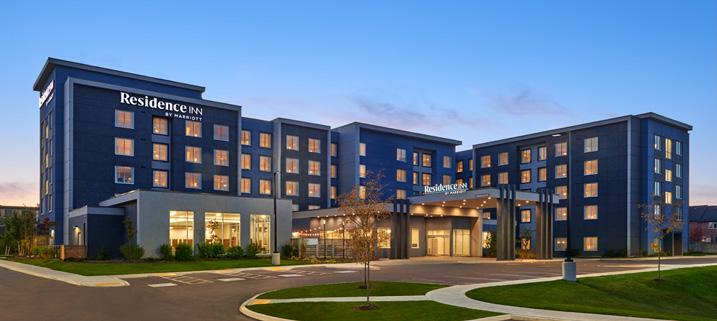
MARRIOTTDEVELOPMENT.COM

© MARRIOTT INTERNATIONAL, INC 2022
FAIRFIELD INN & SUITES ORILLIA
RESIDENCE INN TORONTO MISSISSAUGA SOUTHWEST THE PEARLE HOTEL & SPA, AUTOGRAPH COLLECTION










SUBSCRIBE STAY CONNECTED SUBSCRIBE
How to collab with travel & tourism
 By Jason Sarracini FOUNDER AND CEO LANDSBY
By Jason Sarracini FOUNDER AND CEO LANDSBY
It was January 2020 and I had decided to return to the family travel business my grandfather started in 1967. Twenty years in the travel industry and it was time to work on something that I could control, something that I might one day leave to one of my three children. I didn’t know, of course, that two months later international borders would shut down, airplanes would remain grounded and the world would essentially shelter in place. One thing became clear to me as we rode the pandemic wave: domestic travel was a sleeping giant and it was slowly starting to stir.
The Birth of Landsby
A few years before the global pandemic began, I had met with the Destination Canada team and they introduced me to the Canadian Signature Experiences program—a portfolio of authentic, Canadian experiences designed in 2012 for the

international markets, showcasing iconic Canadian experiences. What really struck me was that as a well-travelled Canadian, born and raised in Toronto with many years in the travel industry, I had not heard of any of these experiences prior to the meeting. Why did they only live as a static PDF on the tourism board website? Why weren’t these experiences being marketed to Canadians?
So, in the spring of 2020, my mind immediately jumped to domestic tourism. Could this be the push we Canadians needed to finally start prioritizing travel in our own country? Was this the opportunity to do something about those experiences I had been dreaming about since my meeting with Destination Canada?
Through my family’s company, I launched a Canadian portfolio with 50 partners from the program and that later led to the birth of Landsby, named after the Nordic word for village.
March April 2022 | staymagazine.ca | 33
What was common across these experiences, and the ones we have since curated ourselves, was the intimate and personal nature of the stay.
Let me give you an example:
One of our most successful experiences is in Gananoque, a small town, about 30 minutes from Kingston, known as the gateway to the 1000 islands. Prior to Landsby, not many people would have considered Gananoque as a winter getaway destination—but our accommodation partner changed all that.
Owned by a couple from Toronto, the Pangea House is a 5-room, heritage inn located on the Gananoque River, just steps from the St. Lawrence. We loved the personalized service and hospitality the owners offered and we worked with them to create a unique package. They accommodated us by offering a common rate across all their rooms and included a spectacular five-course dinner cooked onsite by one of the owners, who is a renowned chef. We added a private, Canadian Signature Experience helicopter tour by 1000 Islands Helicopter Tours and this two-night package has become a bestseller for us, leading to sales for our partners during a time that is typically quiet in that region, and bringing a muchneeded local getaway for Canadians.
When
Packaging inns, bed and breakfasts, and rental properties has not been standard in our industry. We have tried to frame things a bit differently by not insisting on significant discounts, instead appreciating and highlighting the innate hospitality of the owner, engaging the community in the experience and catering to the incredible partnership opportunities across the industry.
At Landsby, we focus on creating experiences that encompass one of the following elements:

• Cultural
• Culinary
• Outdoor
• Wellness
When we wrap unique experiences together with a stay that has character and purpose, it makes for the perfect getaway that I know the Canadian traveller will be seeking for years to come.
Instead of looking for ways to fill rooms, we are looking for ways to bring an experience together for the benefit of multiple partners. In June 2021, for example, my family and I visited a unique property in Southwestern Ontario that offers an immersive Indigenous-led
experience with horses. We stayed in an authentic Tipi, shared food cooked over a fire and listened to traditional drumming and stories that had been passed down by the Ojibwe people for generations. The experience was profound and we still talk about it nearly a year later.

Just a few weeks ago, my colleague and I visited Whitehorse for a winter adventure. While so many of our guests visit the Yukon to view the Northern Lights, we wanted to create a more robust product that not only encompassed a great Aurora viewing, but was supporting the community in other ways. While staying at the welllocated Raven Inn, we also participated in an amazing hands-on glassblowing workshop down the road at Lumel Studios and enjoyed dinner at the Wayfarer Oyster House. Dogsledding and snowmobiling were also part of the experience.
The “stay” is, and always will be, a vital component of the overall tourism experience. After two years at home, consumer expectations are high and we have to be ready to deliver. But this is our opportunity to rebuild in a way that supports all aspects of our Canadian industry in a meaningful way—delivering tourism in a way that gives more to the community than it takes away.
How Can Your Accommodation Take Advantage?
34 | staymagazine.ca | March April 2022
we wrap unique experiences together with a stay that has character and purpose, it makes for the perfect getaway that I know the Canadian traveller will be seeking for years to come.










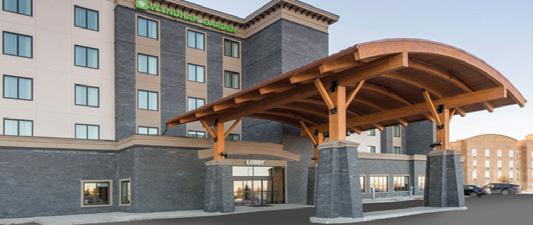







Reach your hotel’s full potential. Visit wyndhamdevelopment.com or call 800-889-9710. 1 As named by US News & World Report. 2 Versus independent or unbranded hotels. 3 In response to internal owner/GM survey based on last visit. This is not an offer. Certain provincial laws regulate the offer and sale of franchises. An offer will only be made in compliance with those laws and regulations, which may require we provide you with a Disclosure Document, a copy of which can be obtained by contacting Wyndham Hotel Group Canada, ULC at 22 Sylvan Way, Parsippany, NJ 07054. In Canada, Days Inn and Travelodge franchises are offered by a third party master franchisee. All hotels are independently owned and operated with the exception of certain hotels managed or owned by an affiliate of the company. © 2022 Wyndham Hotel Group Canada, ULC. All rights reserved. OPEN YOUR HOTEL TO the Wyndham Advantage. Be Efficient. Bottom line savings like up to 20% on OTAs2 driven by Wyndham’s buying power. Be Supported. Wyndham’s performance toolkit and local support team—with 99% owner satisfaction—help maximize profits.3 Be Seen. #1 hotel loyalty program1 with over 90 million members helps to bolster revenue. QUEBEC,
CANADA
WINGATE BY WYNDHAM KANATA WEST OTTAWA ONTARIO, CANADA
WYNDHAM GARDEN CALGARY AIRPORT ALBERTA, CANADA
IMPERATIVE VOICES OF INDUSTRY TODAY





 By Stacey Newman with contributions from Marriott Hotels of Canada
By Stacey Newman with contributions from Marriott Hotels of Canada
Laura Pallotta is the regional vice president of sales and distribution at Marriott Hotels Canada. Pallotta doesn’t believe that the major issues the Canadian hospitality and tourism sectors are facing have changed all that much. As Canada and the sector ramp back up to welcome visitors with travel restrictions lifting, hoteliers and hospitality service providers all over are facing the same issue: how to find and retain talented people who love to work in travel, tourism, and hospitality. And how to introduce the world of hotels to new talent who can build a career in this industry.
“I think my career path and story—along with that of my colleagues and many other Marriott executives, proves that a career in hospitality can reap great rewards, and


that’s what I would encourage others to talk about. We need to reach young people—the university and college community—and tell the story of our industry as an amazing career path. Young people see great benefits in a career where they can also explore the world through travel. Demand for travel is building more than ever again—our future is bright, and we have a great opportunity to get young people excited about careers in hospitality,” says Pallotta.
The following are interviews with Pallotta and two other Marriott executives who are also women. Their leading voices seek to shape the ambitions and paths of other women entering industry, as well as the re-shaping of problematic structures within hospitality and our business systems on the whole.



 LAURA PALLOTTA REGIONAL VICE PRESIDENT OF SALES AND DISTRIBUTION MARRIOTT HOTELS CANADA
LAURA PALLOTTA REGIONAL VICE PRESIDENT OF SALES AND DISTRIBUTION MARRIOTT HOTELS CANADA

How did you get your start in hospitality and tell us a bit about your path?
I started my career in sales when I was just 12 years old, working in a ladies clothing store parttime while I was in school. From there, I worked various retail sales jobs throughout high school and university, before starting in the hospitality industry working in sales for an off-premises catering company.
Soon after, that catering company ended up taking over management of a hotel and that’s how I started my career in hotel sales. I never looked back. I love the hotel industry because there are so many different types of customers and an incredible variety of hotels and roles available. There truly is something for everyone.
I worked in a variety of hotels—including airport, downtown, extended stay, luxury—and ultimately joined Delta Hotels in 2003. After progressive roles in Canada, and Marriott’s acquisition of Delta Hotels in 2015, I was asked to lead Marriott’s Canada Sales Organization and begin the integration of Marriott with Delta Hotels, and eventually, Starwood Hotels.
“ March April 2022 | staymagazine.ca | 37
THE WORLD OF HOTELS IS AN INCREDIBLE OPPORTUNITY! EVERY DISCIPLINE IS COVERED IN OUR BUSINESS—SALES, FINANCE, OPERATIONS, LAW, HUMAN RESOURCES, SUSTAINABILITY.
In terms of promoting a world that is diverse, equitable and inclusive, what are some of the things that you’ve been a part of within Marriott and the industry to effect change?

I am very proud to be the co-chair of Marriott Canada’s Inclusion Council since 2017. We are focused on creating more opportunities for women and those with diverse backgrounds to advance their careers, as well as youth employment through university/college engagement and creating pathways for future leaders.
I am excited about the work we are doing with women, particularly now as there has been an enormous impact on women through this pandemic. We have fostered support and career pathways through our Afternoons of Engagement where we discuss common issues women are facing today and how Marriott can support their career goals and planning.
I am also an active member of the Ryerson University Ted Rogers School of Hospitality Industry Advisory team and regularly speak to young people about career paths in hospitality. I recently mentored some women graduates who are starting their careers in the hotel industry.
How do you juggle the demands of work and life? What do you do to find balance?




Lucky for me, I have a sense of humour and a strong network of support, including my husband, family, and friends around me. My husband is a great partner, and we help each other manage our children’s needs and have some fun along the way. I try not to get overwhelmed by leaning on others when I need them and provide that same support as well. I
manage to stay on top of it all by focusing on being present when I am at work, and then being present for my family when we are together. I also try not to be too hard on myself. Perfection is not possible, but 80 per cent is! Isn’t that an “A?”
For balance, every morning I try and go for a good walk. During that time, I get some fresh air, a bit of exercise, and think about my day ahead while reminding myself what I am grateful for. Recently I have become a golf and pickleball nut. These are very social sports, and I am fueled by spending time surrounded by new people.
What barriers did you face in your career? How did you break them?
I grew up in a working-class family and wasn’t quite sure what a successful business career looked like, and if it was even attainable for me. I sometimes suffered from a lack of confidence and second-guessed myself. When I joined Delta Hotels and eventually Marriott I felt supported. I was afforded great leaders who mentored me and sponsored me and was given the opportunity to take personal and business training that eventually inspired me to pursue senior leadership. I have never looked back, and I am so proud to be a part of this organization and leading the industry here in Canada.
What advice would you give young people interested in pursuing a career in hospitality?
The travel and hospitality industry is fun and exciting, and there are so many different pathways to pursue—hotels, restaurants, meeting and events planning, destination marketing organizations, and more. The world of hotels is an incredible opportunity! Every discipline is covered in
our business—sales, finance, operations, law, human resources, sustainability. You can travel the world and work anywhere and meet amazing people that will be friends and colleagues for life. Travel is roaring back now. Over this pandemic, people recognized more than ever the power of travel and how it fuels you and the incredible importance of human connections.
IT’S WELL BEYOND JUST A JOB.
“
AND THE DEMAND FOR TALENT IS HUGE—WITH A RENEWED DEMAND FOR TRAVEL, WE NEED GREAT PEOPLE TO JOIN US.
38 | staymagazine.ca | March April 2022
ROZ WINEGRAD AREA VICE PRESIDENT OF OWNER AND FRANCHISE SERVICES

OF
CANADA
MARRIOTT HOTELS CANADA
How did you get your start in hospitality and tell us a bit about your path?
I have been with Marriott for 35 years. I started my career in the culinary field. I graduated from culinary school after a BA in history, and my first job out of culinary school was at a Marriott hotel. I was eager to join a company that had a management career path, and I was quickly offered the Management Training Program.
In terms of promoting a world that is diverse, equitable and inclusive, what are some of the things that you’ve been a part of within Marriott and the industry to effect change? Marriott has been a leader in this area. In Canada, we have led the Women

Women are still not ‘having it all’
Despite gaining more positions in political office, women still lag behind men in the world of work according to The Economist’s 2022 glass-ceiling index (GCI). The annual report shows that women are still lagging behind their male counterparts in senior business roles, making up on average only a third of managers and just over a quarter of board seats across the Organisation for Economic Co-operation and Development (OECD).
CANADA RANKS 10TH OUT OF THE 29 COUNTRIES.
Supporting Women initiative, which fosters a gathering of women leaders from within Marriott, and among hotel owners, university leaders, and industry leaders. The purpose of this gathering is to identify ways to promote women in hospitality. I also work with Castell Group and Castell at College on their diversity efforts. The Castell at College program is one that I have recently participated in, leading a panel discussion for university students with women leaders in hospitality.
How do you juggle the demands of work and life? What do you do to find balance?







To me, balance is not the question—the goal is to blend the demands of my personal and professional life in a way that works for me. Hospitality is not a 9-to-5 business. There are times I take off midday to spend time at my son’s school, but then I work later into the evening to catch up. Certainly, this requires family and friends that accommodate and understand the demands of the career.
The GCI is a yearly assessment of where women have the best and worst chances of equal treatment at work in countries in the OECD, a group of mostly rich countries. It combines data on higher education, labourforce participation, pay, child-care costs, maternity and paternity rights, businessschool applications and representation in senior jobs to create a ranking of 29 OECD countries.
This year’s index shows for the second year in a row that Sweden is the best place to work if you are a woman, followed by its Nordic neighbours, Iceland, Finland and Norway. The Nordics are particularly good at helping women complete university, secure a job, access senior positions, and take advantage of quality parental-leave systems and flexible work schedules. South Korea bottoms out the index for the tenth year in a row, with Japan and Turkey not far behind. But there are signs of progress. A new Korean law barring big companies from having single-gender boards, set to go into effect in August 2022, helped lift the proportion of women on boards from less than 5 per cent to 8.7 per cent.
Elections held last year in a handful of OECD countries, including Iceland, the Netherlands, and the Czech Republic, helped push average representation of women in parliaments up to 33 per cent. When The Economist first compiled the index in 2013, that figure was just 26 per cent.
March April 2022 | staymagazine.ca | 39
What barriers did you face in your career? How did you break them?
Starting my career as a woman in culinary was certainly a challenge 35 years ago; however, all along the way, I stayed focused on the goals that I set out for myself and never compromised my personal integrity.
What advice would you give young people interested in pursuing a career in hospitality?


This business provides an amazing career opportunity. It’s exciting, fun, and has enormous opportunity for growth. While not easy, it is certainly rewarding. I have friends for life from working in hotels, corporate and regional roles with Marriott. It’s well beyond just a job. And the demand for talent is huge— with a renewed demand for travel, we need great people to join us.
BRENDA RODRICKS AREA GENERAL MANAGER, MONTREAL MARRIOTT HOTELS CANADA




How did you get your start in hospitality and tell us a bit about your path?

My parents were from India and part of the Anglo-Indian community. In our culture, hospitality is part of the DNA, and in our household, my mother was always making everyone’s favourite food and my father was always ensuring that everyone had their favourite drinks. Our house was always full, and my parents made every single person feel special and welcome. Growing up in this environment, making people happy and comfortable, it was a natural evolution for me to be attracted to the hospitality industry.
My start was at age 16 working in the laundry department part-time and summers, and from there I rotated to room attendant, server, hostess, shortorder cook and room service. I quickly developed a love of this industry and pursued a career in it via a few different brands and getting in-depth experience in front off ice, food and beverage and sales and revenue management. My career with Marriott started in 2009 when I was hired to open the Montreal Airport In-Terminal Hotel.
In terms of promoting a world that is diverse, equitable and inclusive, what are some of the things that you’ve been a part of within Marriott and the industry to effect change?




I have always believed that women have many natural talents suited for this

“
40 | staymagazine.ca | March April 2022
TAKE ADVANTAGE OF EVERY OPPORTUNITY THAT IS PRESENTED TO YOU TO LEARN AND GROW. KEEP AN OPEN MIND ON HOW YOU WANT YOUR CAREER TO PROGRESS, YOU NEVER KNOW WHERE IT WILL LEAD YOU!
industry, and I have always promoted and supported women in the industry. I had the honour of being the first woman president of the Montreal Hotel Association and used this platform to encourage women to pursue a career in this amazing industry. After joining Marriott, I was invited to be the first Canadian representative in 2011 with Marriott’s Diversity and Inclusion group. Through this, I learnt about and promoted all the various key initiatives to the Canadian market. Additionally, diversity and inclusion initiatives and events were supported by our Business Council which I had the opportunity and privilege of leading for seven years.
How do you juggle the demands of work and life? What do you do to find balance?
Editor’s note



In researching and writing this piece, while interacting with the publicity team at tartanbond, I was struck by a comment made to me by the senior account manager with whom I was working. Her name is Lesley Chang. After I had gathered much of what I needed to produce this editorial, Chang sent me a follow-up note in which she stated: “The focus here is positioning hospitality as a viable career option for young people—and trying to attract and retain great people to a great organization. Personally, for me, it was really inspiring to read the responses from the three executives and it reminded me of why I got into travel and tourism in the first place. Thank you so much for this.”
Chang’s words are a reminder of how important it is that we turn up the volume on women’s voices in industry and acknowledge their respective intersectional perspectives.
Thank you to these professionals for their voices, and thank you to tartanbond’s Lesley Chang for reminding me of why I love telling these stories.
– Stacey Newman
I find balance by constantly reminding myself of what my priorities are—both business and personal—and trying not to get lost in the whirlwind. I have learnt to discipline myself to focus on one thing at a time, continually develop the skill of saying no gracefully and to become more efficient with my time. I am also trying to constantly learn from people, books, podcasts, etc. to become a better leader and a better person. I am also a believer in using breathwork when there are deadlines and pressures and using meditation to ensure I keep things in perspective and for clarity of thought.
What barriers did you face in your career? How did you break them?
I think we all face barriers in our careers, and the way I always approached breaking
them was by doing my homework. I did, and still do, analyze each situation and all possible solutions so that I can concisely present my suggestions based on facts and experience. I also try and ensure that my communication is clear and understandable to my audience. I have found this approach reinforced my credibility and helped me gain the confidence of those involved in business situations.
What advice would you give young people interested in pursuing a career in hospitality?
Take advantage of every opportunity that is presented to you to learn and grow. Keep an open mind on how you want your career to progress, you never know where it will lead you!
March April 2022 | staymagazine.ca | 41
THE RECAP
Canadian Hotel Investment and Finance Issue IN 2022
Many owners believe lodging demand will start recovering at a quicker pace than predicted, with average rate holding strong as we patiently await increased demand.

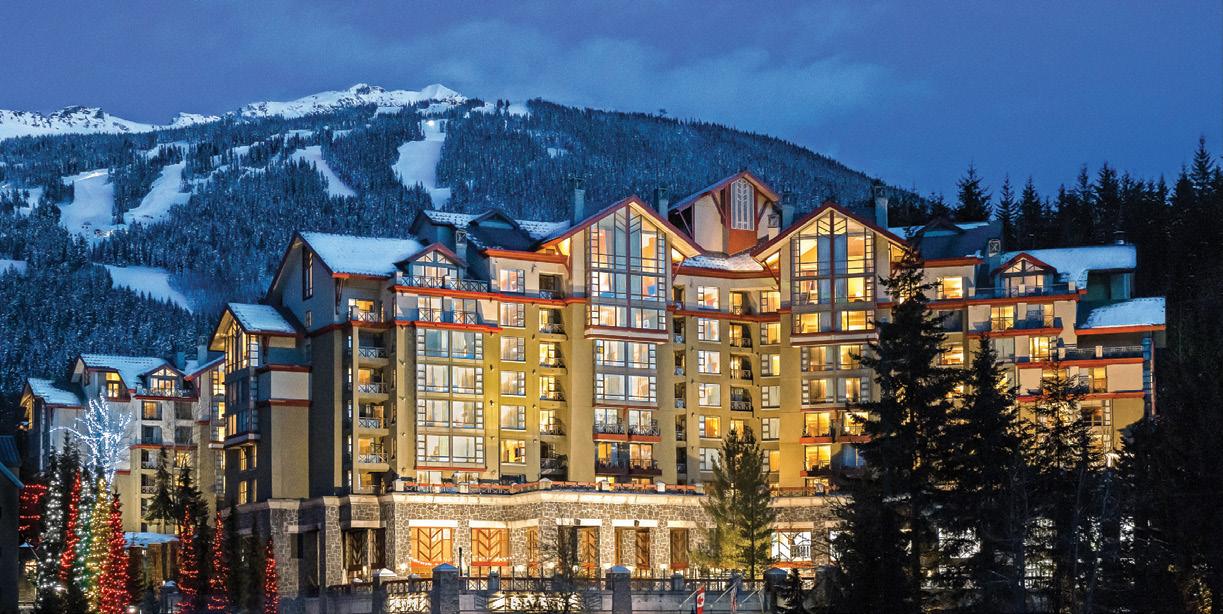
CSR and ESG investing
The term environmental, social and governance (ESG) has grown more common. Although ESG and similar obligations are not necessarily legally compulsory for most companies, many investors see good policies in this area as a sign the firm is well-positioned for the future.”
Some common issues many investors care about include: A

Lifestyle Destination Hotels & Resorts


BELLSTAR.CA | AIMBRIDGEHOSPITALITY.COM | EVOLUTIONHOSPITALITY.COM
COMPANY’S CARBON FOOTPRINT THE USE OF TOXIC CHEMICALS ETHICAL SUPPLY CHAINS EMPLOYMENT EQUITY SOCIAL INCLUSION COMMUNITY ENGAGEMENT BOARD DIVERSITY
Borrowing wisdom from Ed Khediguian
There’s an active market for assets, so values have sustained themselves. And there’s a lack of supply of assets to buy—because the same folks who are wanting to buy, are also the asset holders that are the prospective sellers. Combine that with a shrinking new supply pipeline, the gradual return of demand into the industry will accelerate ability to drive rate and expansion in hotel values. In between now and the next year, we’re going to be evaluating, what is that trough to recovery period? What does that look like from a cash flow perspective? What are prospective stabilized values that you can lend into? And then how do you deal with the capex that hasn’t been spent on the assets that went into cash flow? How do you deal with the dynamics with franchise organizations, they’re trying to return to more standard operations. They’re putting pressure on the borrowers for capex and operating standards and pressure on that cash flow.
So you can get a Good night’s sleep.
The 2022 Glass-Ceiling Index
CANADA RANKS 10TH OUT OF THE 29 COUNTRIES
Despite gaining more positions in political office, women still lag behind men in the world of work according to The Economist’s 2022 glass-ceiling index (GCI). The annual report shows that women are still lagging behind their male counterparts in senior business roles, making up on average only a third of managers and just over a quarter of board seats across the Organisation for Economic Co-operation and Development (OECD). This year’s index shows for the second year in a row that Sweden is the best place to work if you are a woman, followed by its Nordic neighbours, Iceland, Finland and Norway.
Jeff Citron jcitron@goodmans.ca
Mario Di Fiore mdifiore@goodmans.ca
Bram Green bgreen@goodmans.ca
our Hospitality Group:
Contact
Goodmans Hospitality Group are leaders in the field with a wide range of experience and the ingenuity to devise creative solutions to business challenges. By blending this expertise with the related practices of commodity tax, construction law, real estate, municipal and land planning, intellectual property and our labour and employment practice groups, we provide the business insight and legal advice necessary to assist you in achieving your goals.
goodmans.ca
CANADIAN HOTEL INTELLIGENCE
Six digital issues per year + biweekly email newsletters; keeping readers engaged, informed and equipped with the best data and analysis the industry offers—with a vivid and gorgeous aesthetic.





CUSTOMIZED MARKETING OPPORTUNITIES
PARTNERSHIPS




We welcome ideas and ongoing collaboration. We will always remain attentive and agile, willing to listen to new ideas that align with our editorial mandate. Come talk to us and let us know how we can strengthen our collective voice in this industry.
STAYMAGAZINE.CA/ADVERTISE
CUSTOM CAMPAIGNS
Our team is here to work for your product and brand. With 30+ years in the B2B industry and with the necessary skills and platforms to deliver both digitally and in print, let our senior content team work for you.
STAY IS






















 George Brown College
George Brown College









 Robin McLuskie Managing Director | Hotels Colliers Hotels
Robin McLuskie Managing Director | Hotels Colliers Hotels


 Fraser Macdonald Director | Hotels | Canada Colliers Hotels
Fraser Macdonald Director | Hotels | Canada Colliers Hotels
 Alam Pirani Executive Managing Director Hotels Canada & Caribbean Colliers Hotels
Alam Pirani Executive Managing Director Hotels Canada & Caribbean Colliers Hotels




























 By Joe Baker
By Joe Baker








 Hilton
Hilton


















 By Jason Sarracini FOUNDER AND CEO LANDSBY
By Jason Sarracini FOUNDER AND CEO LANDSBY


























 By Stacey Newman with contributions from Marriott Hotels of Canada
By Stacey Newman with contributions from Marriott Hotels of Canada




 LAURA PALLOTTA REGIONAL VICE PRESIDENT OF SALES AND DISTRIBUTION MARRIOTT HOTELS CANADA
LAURA PALLOTTA REGIONAL VICE PRESIDENT OF SALES AND DISTRIBUTION MARRIOTT HOTELS CANADA











































